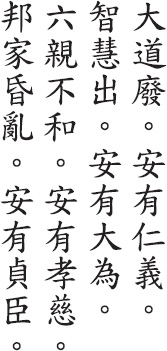18
 |
When the Great Way disappears we meet kindness and justice when reason appears we meet great deceit when the six relations fail we meet obedience and love when the country is in chaos we meet upright officials |
Connecting this with the previous verse, WEI YUAN says, “What people love and praise are kindness and justice. What people fear is reason. And what people despise is deceit.”
SUNG CH’ANG-HSING says, “It isn’t the Great Way that leaves Humankind and goes into hiding. It’s Humankind that leaves the Great Way and replaces it with kindness and justice.”
SU CH’E says, “When the Great Way flourishes, kindness and justice are at work. But people don’t realize it. Only after the Great Way disappears, do kindness and justice become visible.”
WANG AN-SHIH says, “The Way hides in formlessness. Names arise from discontent. When the Way hides in formlessness, there isn’t any difference between great or small. When names arise from discontent, we get distinctions such as kindness, justice, reason, and so forth.”
HO-SHANG KUNG says, “When the kingdom enjoys peace, no one thinks about kindness, and the people are free of desire. When the Great Way prevails, kindness and justice vanish, just as the stars fade when the sun appears.”
MENCIUS says, “Kindness means dwelling in peace. Justice means taking the right road” (Mencius: 4A.10).
TE-CH’ING says, “Reason is what the sage uses to order the kingdom. It includes the arts, measurements, and laws. In the High Ages, people were innocent, and these were unknown. In the Middle Ages, people began to indulge their feelings, and rulers responded with reason. And once reason appeared, the people responded with deceit.”
WANG PI says, “The six relations are between father and son, elder and younger brothers, husband and wife. When these six relations are harmonious, the country governs itself, and there is no need for obedience, love, or honesty.”
WANG P’ANG says, “During a virtuous age, obedience and love are considered normal. Hence, no one is called obedient or loving. Nowadays, when someone is obedient or loving, we praise them. This is because the six relations are no longer harmonious. Moreover, when peace prevails, everyone is honest. How can there be honest officials?”
CH’ENG HSUAN-YING says, “When the realm is at peace, loyalty and honesty are nowhere to be seen. Innocence and virtue appear when the realm is in chaos.”
LI JUNG says, “During the time of the sage emperors Fu Hsi and Shen Nung, there was no mention of officials. It was only during the time of the despots Chieh and Chou that we begin to hear of ministers such as Kuan Lung-feng and Pi Kan.”
WU CH’ENG says, “Shao Juo-yu assigns these four divisions to emperors, kings, the wise, and the talented.”
Although I have left this verse in its traditional form, the Kuotien texts and both Mawangtui copies begin line one with ku (therefore), and some commentators have concluded that the two verses must have once been one. Lines three and four are missing in the Kuotien texts. Commentators often quote Chuang-tzu here: “When springs dry up, fish find themselves in puddles, spraying water on each other to keep each other alive. Better to be in a river or lake and oblivious of one another” (Chuangtzu: 6.5).